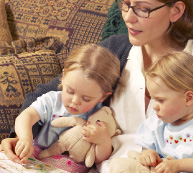Developmental Perspective
 Parents are often curious about how life looks through their children’s eyes. You can think of a child’s phase of development as being like a lens through which they see their world. When you understand things from your child’s developmental perspective, it is easier to parent more effectively.
Parents are often curious about how life looks through their children’s eyes. You can think of a child’s phase of development as being like a lens through which they see their world. When you understand things from your child’s developmental perspective, it is easier to parent more effectively.
Each phase of development is characterized by a set of emotional milestones that your child is striving to achieve. It helps to recognize these milestones and to think about how they are affected by your emotional and physical health, by changes in your family’s time together, and your support network. Understanding this interplay helps you anticipate challenges and negotiate them in ways that help your child cope well and stay on developmental track.
Each age is also characterized by some difficult behaviors and normal parenting stresses. By recognizing what is normal at a particular age, parents can avoid the common experience of assuming that all their child’s stressing and distressing behaviors are the result of illness or treatment-related changes.
As a rule, when parents do their best to maintain a child’s normal schedule and routine, focus on protecting some amount of regular daily and weekly family time, and create an environment of open communication within the family, children and adolescents cope very well with a parent’s illness. Children and adolescents are likely to have additional concerns about their parent’s health and some distress about the necessary changes at home. It would be of concern if children had no reactions to a significant event in the life of their family. But, most children doing well with school, friends, and at home prior to a parent’s diagnosis of cancer continue to do well through the treatment. Those children who were struggling in one or more of these areas prior to a parent’s illness are likely to have extra difficulty weathering the disruptions and worries of the parent’s illness.
 MENU
MENU


